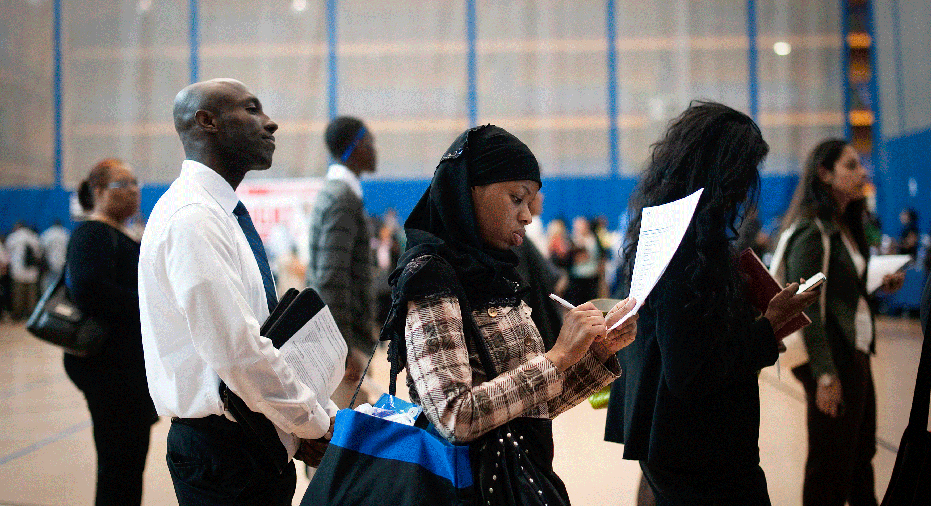The Importance of Giving Thanks During the Job Hunt

In the spirit of Thanksgiving, giving thanks in your career and job search can help you stand out from a saturated job-seeking market.
“People love hearing from people who show gratitude and appreciation in your job, work and colleagues,” says Scott Dobroski, community expert at career website Glassdoor.
When hiring managers were asked whether thank you notes made a difference, 64% said they were helpful, according to a survey from temping company Accountemps.
“In this job market, every little bit counts and gets noticed by the hiring manager,” says Nicole Williams, LinkedIn’s career expert.
Small gestures like a thank-you note after an interview can sway a hiring decision. “A lot of people don’t send thank you notes and it’s just another opportunity to sell yourself,” says Julie Jansen, career coach and author of I Don’t Know What I Want, But I Know It’s Not This. It’s a way to reinforce your strengths and clarify points in the interview disguised in a thank you.
Thank-you and follow-up notes give another opportunity to reinforce your experience and showcase your personality. “Recruiting and hiring managers stress that cultural fit is key and they want to know if you’ll fit in with the team,” says Amanda Augustine, job search expert at TheLadders. Fitting in well with a team is a huge deciding factor for your success at a new company.
What Should You Write?
Experts recommend keeping the note short—no more than three short paragraphs. “Thank whoever you met with for their time, what you specifically enjoyed about the discussion and point out follow up,” recommends Dobroski.
Reinforce points from the interview and address any challenges or problems, says Augustine. This will help you advance your position among other candidates and give the company a reason to bring you back. “Take a moment after the interview and think if there are any objections or reluctance that you can clarify or elaborate on that will help advance you to the next round.”
Don’t forget to add a personal touch by mentioning a product, network or professional organization that may have been brought up in conversation and that you are following up on, advises Williams. “Add that you appreciate [his or] her time and admire [his or] her work—a little sincere validation goes a long way.”
At the end of your note, Dobroski suggests including, “I look forward to speaking with you again. Thank you for the opportunity.”
Proofread your note several times to make sure there are no spelling or grammar mistakes and be sure to include your contact information.
“Sending a message full of mistakes is just as bad as sending nothing,” says Augustine.
How and When to Send the Note
The content of a thank-you note stays the same no matter the delivery method—but is it better to handwrite a note and send it in the mail or type an email?
“Startups expect something sooner than three to four days after the interview—email gives us that capability,” says Augustine.
For electronic notes, send a simple email without any bells and whistles—do not send an ecard, says Dobroski. “When you’re trying to make a professional impression on someone, cards with graphics and bright colors are unprofessional.” Dobroski recommends sending an email within 48 hours.
Traditional companies will most likely expect handwritten notes, according to Augustine. “If you’re not sure, do what you’re most comfortable with and send something thoughtful.”
Depending on the position your thank you note can help demonstrate your skillset, says Augustine. If you’re applying for design positions, consider something creative that showcases your talent like a card that you designed.
If you decide to send handwritten notes, experts recommend using a card with a blank inside that says “Thank you” on the outside and mailing them the same day as your interview.
Don’t Use Social Media
“Stay away from social media unless you’re applying for a social media job,” says Dobroski. If you do decide to use social media, send a direct message to that person.
Tweeting a thank you or sending a public message could disqualify you from a job. “For a majority of companies, hiring processes are kept private and hiring managers may not want to get called out by name.”
What’s Next?
Experts recommend following up with the hiring manager a week or two after the interview. “Add value in the follow up and keep the dialog going on a business level—mention something that’s applicable to the job or company,” says Jansen.



















